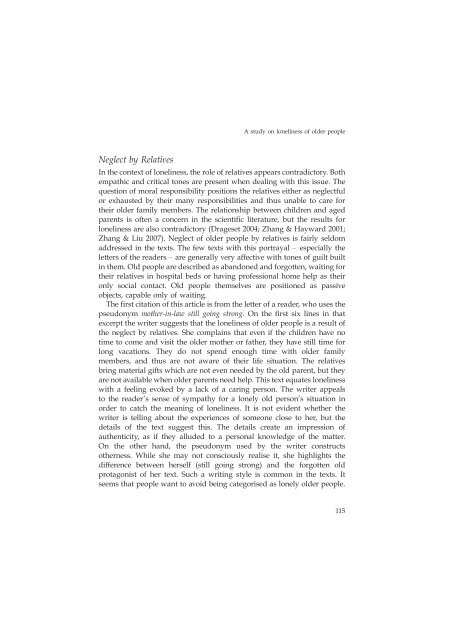Avaa tiedosto - TamPub - Tampereen yliopisto
Avaa tiedosto - TamPub - Tampereen yliopisto
Avaa tiedosto - TamPub - Tampereen yliopisto
You also want an ePaper? Increase the reach of your titles
YUMPU automatically turns print PDFs into web optimized ePapers that Google loves.
A study on loneliness of older people<br />
Neglect by Relatives<br />
In the context of loneliness, the role of relatives appears contradictory. Both<br />
empathic and critical tones are present when dealing with this issue. The<br />
question of moral responsibility positions the relatives either as neglectful<br />
or exhausted by their many responsibilities and thus unable to care for<br />
their older family members. The relationship between children and aged<br />
parents is often a concern in the scientific literature, but the results for<br />
loneliness are also contradictory (Drageset 2004; Zhang & Hayward 2001;<br />
Zhang & Liu 2007). Neglect of older people by relatives is fairly seldom<br />
addressed in the texts. The few texts with this portrayal especially the<br />
letters of the readers are generally very affective with tones of guilt built<br />
in them. Old people are described as abandoned and forgotten, waiting for<br />
their relatives in hospital beds or having professional home help as their<br />
only social contact. Old people themselves are positioned as passive<br />
objects, capable only of waiting.<br />
The first citation of this article is from the letter of a reader, who uses the<br />
pseudonym mother-in-law still going strong. On the first six lines in that<br />
excerpt the writer suggests that the loneliness of older people is a result of<br />
the neglect by relatives. She complains that even if the children have no<br />
time to come and visit the older mother or father, they have still time for<br />
long vacations. They do not spend enough time with older family<br />
members, and thus are not aware of their life situation. The relatives<br />
bring material gifts which are not even needed by the old parent, but they<br />
are not available when older parents need help. This text equates loneliness<br />
with a feeling evoked by a lack of a caring person. The writer appeals<br />
to the reader’s sense of sympathy for a lonely old person’s situation in<br />
order to catch the meaning of loneliness. It is not evident whether the<br />
writer is telling about the experiences of someone close to her, but the<br />
details of the text suggest this. The details create an impression of<br />
authenticity, as if they alluded to a personal knowledge of the matter.<br />
On the other hand, the pseudonym used by the writer constructs<br />
otherness. While she may not consciously realise it, she highlights the<br />
difference between herself (still going strong) and the forgotten old<br />
protagonist of her text. Such a writing style is common in the texts. It<br />
seems that people want to avoid being categorised as lonely older people.<br />
115














